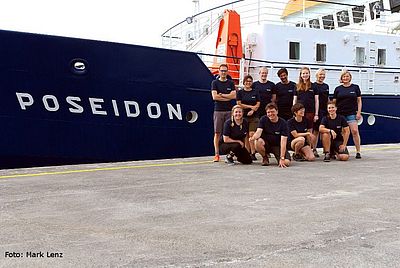The Research cruise POS536 took place from 17th August until 12th September 2019. The goal of POS536 was to investigate the vertical transport of plastic particles in the North Atlantic gyre, also known as the North Atlantic garbage patch. To date we have a rough idea of how much plastic is washed into our oceans on an annual basis, but the amount of plastic actually found in the oceans does not add up to this. Therefore we investigated if a potential vertical transport to the ocean floor in the great gyres of the oceans (each in every ocean on every hemisphere) is accounting for this discrepancy. We used different equipment like a surface catamaran, in situ pumps, sediment traps, WP2 nets, Bongo nets, boxcorer and multicorer to sample different depths from the surface down to the ocean floor. We were able to collect more than 130 pieces of macroplastic (>0,5 mm) with the surface catamaran alone, which will be used for future projects to investigate the bacterial communities establishing on this particles and if they are potentially able to degrade the plastic. The investigation of micro- and nanoplastic particles in the other samples will take more time in the labs of GEOMAR in Kiel.
Chief scientist Dr. Mark Lenz, Dr. Erik Borchert (Hentschel lab)
Links:
https://twitter.com/hashtag/POS536?src=hash
https://gramha.net/explore-hashtag/POS536
https://oceanrep.geomar.de/47563/
https://oceanrep.geomar.de/47642/
https://oceanrep.geomar.de/47675/
https://www.oceanblogs.org/mikroplastik54n/2019/08/27/heute-mal-was-anderes-mikroplastik-bei-33n/
https://www.oceanblogs.org/mikroplastik54n/2019/09/02/wo-ist-das-ganze-plastik-ein-erster-und-ein-zweiter-blick-auf-den-nordatlantischen-muellstrudel/
https://www.oceanblogs.org/mikroplastik54n/2019/09/09/kurs-malaga-der-letzte-teil-der-reise-hat-begonnen/



